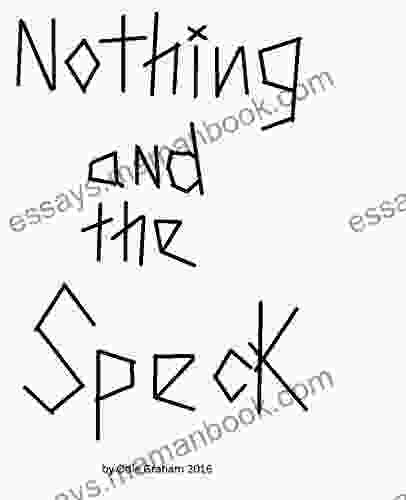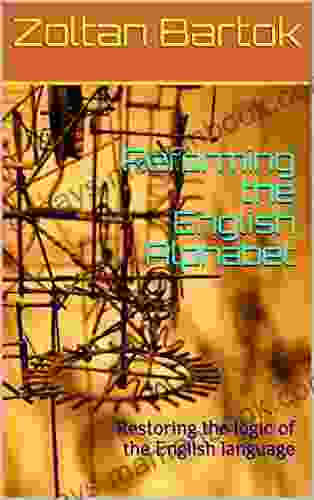Reforming the English Alphabet: A Long-Overdue Change

5 out of 5
| Language | : | English |
| File size | : | 2181 KB |
| Text-to-Speech | : | Enabled |
| Screen Reader | : | Supported |
| Enhanced typesetting | : | Enabled |
| Print length | : | 17 pages |
| Lending | : | Enabled |
The English alphabet is a mess. It's full of unnecessary letters, inconsistent spellings, and illogical rules. It's time for a reform.
Here are some of the problems with the English alphabet:
- It has too many letters. The English alphabet has 26 letters, which is more than most other languages. This makes it harder to learn and remember.
- The spelling is inconsistent. Many words in English are spelled differently than they sound. For example, the word "knight" is pronounced "nite." This can make it difficult to read and write.
- The rules are illogical. There are many rules in English spelling that don't make sense. For example, the letter "c" can be pronounced like a "k" or a "s." This can make it difficult to learn how to spell.
These problems with the English alphabet have a number of negative consequences. They make it harder to learn to read and write, and they can lead to errors in communication. They also make it more difficult for people to learn English as a second language.
It's time for a reform of the English alphabet. We need an alphabet that is easier to learn, more consistent, and more logical. There are a number of different proposals for alphabet reform, but one of the most popular is the Spelling Society's Simplified Spelling (SSS).
The SSS is a phonemic alphabet, which means that each letter represents a single sound. This would make English spelling much more consistent. The SSS also eliminates unnecessary letters, such as the letters "c" and "q." This would make the alphabet easier to learn.
Reforming the English alphabet would be a major undertaking, but it would be worth it. A reformed alphabet would make English easier to learn and use, and it would benefit everyone who speaks the language.
Benefits of Alphabet Reform
There are a number of benefits to reforming the English alphabet. These benefits include:
- Easier to learn. A reformed alphabet would be easier to learn because it would be more consistent and logical. This would make it easier for children to learn to read and write, and it would also make it easier for people to learn English as a second language.
- More consistent. A reformed alphabet would be more consistent because each letter would represent a single sound. This would make it easier to spell words correctly and to understand how words are pronounced.
- More logical. A reformed alphabet would be more logical because the rules of spelling would be more consistent. This would make it easier to learn how to spell and to avoid errors.
- Better communication. A reformed alphabet would lead to better communication because it would reduce errors in spelling and pronunciation. This would make it easier for people to understand each other, and it would also make it easier to communicate in a globalized world.
Reforming the English alphabet is a long-overdue change. It would make English easier to learn, more consistent, and more logical. It would also lead to better communication. It's time to take action and make this change happen.
5 out of 5
| Language | : | English |
| File size | : | 2181 KB |
| Text-to-Speech | : | Enabled |
| Screen Reader | : | Supported |
| Enhanced typesetting | : | Enabled |
| Print length | : | 17 pages |
| Lending | : | Enabled |
Do you want to contribute by writing guest posts on this blog?
Please contact us and send us a resume of previous articles that you have written.
 Top Book
Top Book Novel
Novel Fiction
Fiction Nonfiction
Nonfiction Literature
Literature Paperback
Paperback Hardcover
Hardcover E-book
E-book Audiobook
Audiobook Bestseller
Bestseller Classic
Classic Mystery
Mystery Thriller
Thriller Romance
Romance Fantasy
Fantasy Science Fiction
Science Fiction Biography
Biography Memoir
Memoir Autobiography
Autobiography Poetry
Poetry Drama
Drama Historical Fiction
Historical Fiction Self-help
Self-help Young Adult
Young Adult Childrens Books
Childrens Books Graphic Novel
Graphic Novel Anthology
Anthology Series
Series Encyclopedia
Encyclopedia Reference
Reference Guidebook
Guidebook Textbook
Textbook Workbook
Workbook Journal
Journal Diary
Diary Manuscript
Manuscript Folio
Folio Pulp Fiction
Pulp Fiction Short Stories
Short Stories Fairy Tales
Fairy Tales Fables
Fables Mythology
Mythology Philosophy
Philosophy Religion
Religion Spirituality
Spirituality Essays
Essays Critique
Critique Commentary
Commentary Glossary
Glossary Bibliography
Bibliography Index
Index Table of Contents
Table of Contents Preface
Preface Introduction
Introduction Foreword
Foreword Afterword
Afterword Appendices
Appendices Annotations
Annotations Footnotes
Footnotes Epilogue
Epilogue Prologue
Prologue Mary Ruefle
Mary Ruefle Jennifer Block
Jennifer Block Ken Spiro
Ken Spiro David Smith
David Smith Jaime Karl Hudson
Jaime Karl Hudson Jedidiah Jenkins
Jedidiah Jenkins Joanna Fortune
Joanna Fortune Charles J Fourie
Charles J Fourie Jennifer L Green
Jennifer L Green Dan Jurgens
Dan Jurgens Adrian Ernesto Cepeda
Adrian Ernesto Cepeda Patrick Thomas
Patrick Thomas Audrey Monke
Audrey Monke Anna Ziegler
Anna Ziegler Morgan Moeller
Morgan Moeller Bronwyn Ward Manson
Bronwyn Ward Manson Frederick Johnson
Frederick Johnson Mick Herron
Mick Herron William N Bender
William N Bender Stephen Matthews
Stephen Matthews
Light bulbAdvertise smarter! Our strategic ad space ensures maximum exposure. Reserve your spot today!

 Manuel ButlerThe Ultimate Guide to Blood Pressure: Solution, Super Foods, DASH Diet, and...
Manuel ButlerThe Ultimate Guide to Blood Pressure: Solution, Super Foods, DASH Diet, and...
 Walter SimmonsLittle Narwhal's Secret Creature Day: Exploring the World's Most Elusive...
Walter SimmonsLittle Narwhal's Secret Creature Day: Exploring the World's Most Elusive... Bruce SnyderFollow ·8.5k
Bruce SnyderFollow ·8.5k Greg FosterFollow ·12.5k
Greg FosterFollow ·12.5k Sidney CoxFollow ·3.5k
Sidney CoxFollow ·3.5k Seth HayesFollow ·12.7k
Seth HayesFollow ·12.7k Caleb LongFollow ·18.6k
Caleb LongFollow ·18.6k Albert CamusFollow ·6.9k
Albert CamusFollow ·6.9k Corey GreenFollow ·14.8k
Corey GreenFollow ·14.8k Derek BellFollow ·15.6k
Derek BellFollow ·15.6k

 Dean Butler
Dean ButlerBlack Widow 2024: A Comprehensive Guide to Kelly...
In 2024, Marvel...

 Gage Hayes
Gage HayesNothing and the Speck: An In-Depth Analysis of Yana...
Yana Toboso's works, particularly the manga...

 Stan Ward
Stan WardThe Best American Poetry 1997: James Tate
The Best American Poetry...

 Corey Green
Corey GreenThe Chance of Home: Exploring the Poetic Landscape of...
Immerse yourself in the evocative world of...
5 out of 5
| Language | : | English |
| File size | : | 2181 KB |
| Text-to-Speech | : | Enabled |
| Screen Reader | : | Supported |
| Enhanced typesetting | : | Enabled |
| Print length | : | 17 pages |
| Lending | : | Enabled |












